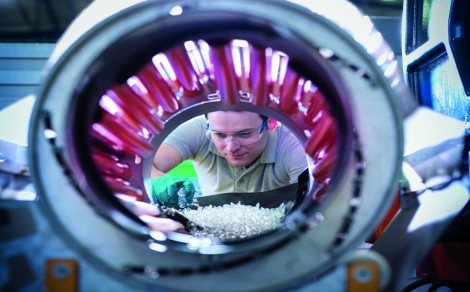- Home » Editorial » Hydraulics
Optimise today, accelerate tomorrow

In an increasingly competitive market, prioritising high performance lubrication is an essential part of optimising equipment performance as it allows your machinery to endure conditions like fluctuating temperatures and high pressures. High performance lubricants, such as Shell Tellus S4 ME, are specially formulated to meet these demands and can last up to 10 times longer than industry standard oil life.1
One example of this is leading plastic packaging solutions company, Alpla, who switched to Shell Tellus S3M lubrication. This transition extended machinery oil life from 5000 to 15,000 hours, generating annual savings of over $16,000. The enhancing properties of premium lubrication such as increased oil life have the potential to maximise your equipment’s productivity, reduce downtime and increase energy efficiency – factors that ultimately help reduce total cost of ownership.
Q: How have lubricants evolved in recent times to meet the demands of modern equipment?
A: The plastics injection moulding industry is expected to grow to $496 billion across the globe by 2025. As outputs increase, machinery becomes more advanced and the role of lubricants becomes even more critical. Lubrication is no longer just a part of equipment maintenance procedures but plays a critical role in helping manufacturers to boost productivity, improve precision, reduce costs and waste, ultimately giving them a stronger competitive advantage.
Modern lubricants, like the Shell Tellus range, are formulated to meet the demands of these sophisticated hydraulics systems. Modern systems are often more compact, and therefore more susceptible to oxidation and the formation of contaminants such as sludge and varnish. Shell Tellus oils are designed and can help to improve oxidation resistance to restrict the formation of these acidic contaminants, increasing equipment life and productivity.
To meet the requirements for a continuous and consistent production cycle, machinery has to work harder for longer, which in turn, generates more heat. Modern lubricants need to offer resistance against heat deterioration, Shell Tellus oils offer better wear protection and greater thermal stability, to help increase the service life of your equipment.
With a growing demand for peak efficiency, modern lubrication is an essential support for operators, to help them mitigate the risk of unplanned downtime and optimise the lifespan of their machinery.
Q: What type of service and support provision should end users and OEMs insist on from their lubricant supplier?
A: The potential impact of lubrication choice and maintenance on a company’s operations, output, and total cost of ownership is immense. As such, it’s pivotal that all employees and staff, who are at the frontline of equipment operations, undergo training in how to maximise the benefits of an effective maintenance regime. By instilling the help of technical experts through training programmes like Shell LubeCoach, OEMs and equipment operators can improve their staff’s understanding of lubrication choice and support them in the adoption of a successful maintenance regime.
Equally, with so many factors to consider during lubricant selection, application, and equipment running processes, OEMs and equipment operators need to ensure that they are receiving expert advice and guidance to support them with any questions and challenges they may face and achieve measurable results. However, 56% of manufacturers feeling that there is a lack of trusted third-party experts to provide support. With over 260 technical experts globally at Shell Lubricants, we work closely with customers via lubricant related services, LubeChat, Lube Advisor and Lube Analyst to provide tailored support, knowledge-sharing and consultancy.
Q: What technological advances can we expect to see in the future?
A: The plastic injection moulding industry is experiencing a rise in ‘smart’ factories. These are underpinned by Industry 4.0 technologies, which support digitisation and automation of operations, such as AI, big data and Internet of Things (IoT) means that manufacturers are steering towards digitised and automated operations. By leveraging Industry 4.0 technologies, operators can benefit from factors such as remote monitoring, maintenance and data-driven decision making. By adopting the TCO saving technologies of today, operators can reinvest saved costs into the uptake of smart factories in the future.
-
PPMA 2025
23 September, 2025, 9:30 - 25 September, 2025, 16:00
NEC, Birmingham UK -
Advanced Engineering Show 2025
29 October, 2025, 9:00 - 30 October, 2025, 16:00
NEC, Birmingham UK










